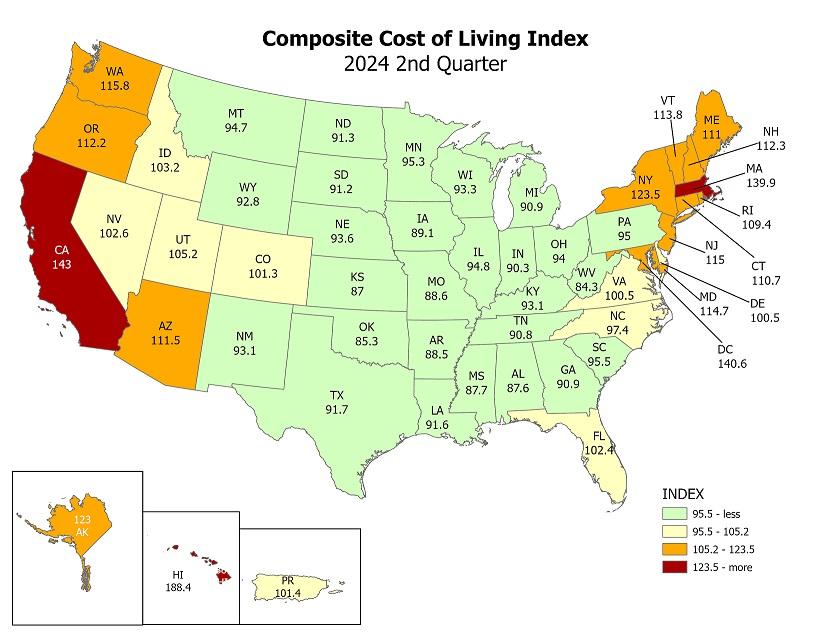Moving To Detroit From Texas
As the fourth largest city in the United States by land area, Detroit, Michigan, is a vibrant city with a rich history, cultural attractions, and a thriving economy. However, for those moving to Detroit from Texas, the transition can be quite significant. From the humid subtropical climate of Texas to the cold winters and humid summers of Detroit, there are many adjustments to be made. This article will serve as a comprehensive guide for Texans making the move to Detroit, providing valuable insights into the city's cost of living, job market, neighborhoods, and more.

- Leaving the Lone Star State: A Comprehensive Guide to Moving to Detroit from Texas
- Is it a good idea to move to Detroit?
- Is it cheaper to live in Michigan or Texas?
- What is the best state to move to from Texas?
- Why are people moving out of Detroit?
- FAQ
- What are the biggest cultural differences I'll face when moving from Texas to Detroit?
- How do I find affordable housing in Detroit when moving from Texas?
- What kind of job opportunities can I expect to find in Detroit compared to Texas?
- How do I get around Detroit without a car, coming from Texas where driving is a necessity?
Leaving the Lone Star State: A Comprehensive Guide to Moving to Detroit from Texas
Moving to Detroit from Texas can be a significant change, especially considering the vastly different cultures, economies, and lifestyles of the two regions. However, with proper planning and preparation, this transition can be a successful and enriching experience.
Climate and Geography: What to Expect in Detroit
One of the most notable differences between Texas and Detroit is the climate. Detroit experiences a humid continental climate with cold winters and warm summers, whereas Texas has a more subtropical climate with mild winters and hot summers. Additionally, Detroit is located in the Great Lakes region, which means that the city experiences a significant amount of lake-effect snowfall during the winter months. In order to prepare for the climate shift, it's essential to invest in warm clothing, including a heavy coat, gloves, hats, and scarves. You may also want to consider purchasing snow tires or snow chains for your vehicle to ensure safe driving during the winter months.
Cost of Living: How Detroit Compares to Texas
The cost of living in Detroit is generally lower than in Texas, especially when it comes to housing costs. According to data from Zillow, the median home value in Detroit is around $140,000, whereas in Texas, the median home value is around $240,000. Rent prices are also significantly lower in Detroit, with the average rent for a one-bedroom apartment being around $800 per month, compared to $1,200 per month in Texas. However, it's essential to note that the cost of living in Detroit can vary greatly depending on the neighborhood and proximity to downtown. Some neighborhoods, such as Midtown and Downtown, have seen significant gentrification and may have higher prices for housing and amenities.
Job Market and Economy: Opportunities in Detroit
Detroit has experienced significant economic growth in recent years, with major industries including healthcare, technology, and manufacturing. The city is also home to several major companies, including Ford, General Motors, and Quicken Loans. However, the job market in Detroit is still recovering from the economic downturn of the early 2000s, and wages are generally lower than in Texas. To increase your chances of finding a job in Detroit, it's essential to have a strong skill set and to be flexible in terms of industry and job type. You may also want to consider networking and building connections in the Detroit job market before making the move.
Culture and Community: What to Expect in Detroit
Detroit is a city with a rich cultural heritage, including a vibrant arts scene, a strong sense of community, and a diverse population. The city is home to several major museums, including the Detroit Institute of Arts and the Motown Museum, as well as a variety of festivals and events throughout the year. However, Detroit is also a city that has experienced significant challenges, including poverty, crime, and urban decay. To get the most out of your experience in Detroit, it's essential to be open-minded, flexible, and willing to engage with the community.
Logistics and Planning: Making the Move to Detroit
When planning your move to Detroit from Texas, there are several logistical considerations to keep in mind. First, you'll need to decide whether to drive or fly to Detroit, and to plan your transportation accordingly. You'll also need to research and secure housing, either by purchasing a home or renting an apartment. In addition, you'll need to plan for utilities, including electricity, gas, and water, as well as internet and cable services. You may also want to consider hiring a moving company or renting a moving truck to transport your belongings.
| Category | Texas | Detroit |
|---|---|---|
| Median Home Value | $240,000 | $140,000 |
| Average Rent (1-bedroom apt) | $1,200/month | $800/month |
| Unemployment Rate | 3.4% | 4.2% |
| Average Snowfall | 2 inches | 71 inches |
Is it a good idea to move to Detroit?

Detroit, Michigan, has a rich history and has been a hub for innovation and industry in the United States. However, in recent years, the city has faced significant challenges, including population decline, economic downturn, and urban decay. Despite these challenges, Detroit is undergoing significant revitalization efforts, making it an attractive option for people looking to move to a city with a strong sense of community and a low cost of living.
Pros of moving to Detroit
Detroit offers several advantages for people considering a move to the city. Here are some of the key benefits:
- Affordable cost of living: The cost of living in Detroit is significantly lower compared to other major cities in the United States. The median home price is around $150,000, and the average rent for a one-bedroom apartment is around $1,000 per month.
- Rich cultural heritage: Detroit is known for its rich cultural heritage, including its contributions to music, art, and literature. The city is home to numerous museums, galleries, and performance venues.
- Vibrant entrepreneurship scene: Detroit has a thriving startup ecosystem, with numerous incubators, accelerators, and coworking spaces. The city is also home to several major companies, including Ford, General Motors, and Quicken Loans.
Cons of moving to Detroit
While Detroit has its advantages, there are also some drawbacks to consider. Here are some of the key challenges:
- Crime rates: Detroit has high crime rates compared to other cities of similar size. The city has struggled with violence, theft, and property crime.
- Urban decay: Many parts of Detroit have suffered from urban decay, with abandoned buildings, vacant lots, and neglected infrastructure.
- Economic uncertainty: While Detroit has made significant progress in recent years, the city's economy is still recovering from the decline of the automotive industry.
Neighborhoods to consider in Detroit
Detroit has several unique neighborhoods to consider when deciding where to live. Here are a few options:
- Midtown: Known for its vibrant cultural scene, Midtown is home to several museums, galleries, and performance venues. It's also a popular spot for restaurants, bars, and coffee shops.
- Corktown: This historic neighborhood is one of the oldest in Detroit and is known for its charming Victorian-era homes and vibrant nightlife.
- Rivertown: Located along the Detroit River, Rivertown is a popular spot for outdoor recreation and offers stunning views of the river and Lake Erie.
Is it cheaper to live in Michigan or Texas?

The cost of living in Michigan versus Texas depends on various factors such as lifestyle, location, and personal preferences. However, here's a general breakdown of the expenses in both states.
Housing
The cost of housing varies significantly between Michigan and Texas. The median home price in Michigan is around $230,000, while in Texas it's around $270,000. However, the average rent for a one-bedroom apartment in Michigan is $800, compared to $1,100 in Texas. Here are some approximate costs of housing in both states:
- Mortgage payment: Michigan - $1,300/month, Texas - $1,600/month
- Rent: Michigan - $800/month, Texas - $1,100/month
- Property taxes: Michigan - 1.2% of the home value, Texas - 1.9% of the home value
Food and Transportation
Food prices are relatively similar in both states, with some slight variations. A gallon of milk costs around $2.50 in Michigan and $2.70 in Texas. However, transportation costs differ significantly. Michigan has higher gas taxes, which means gas prices are around $0.10 more per gallon compared to Texas. Here are some approximate costs of food and transportation in both states:
- Fast food meal: Michigan - $7, Texas - $8
- Gallon of gas: Michigan - $2.80, Texas - $2.70
- Monthly public transportation pass: Michigan - $70, Texas - $90
Taxes and Utilities
Michigan has a higher state income tax rate, at 4.25%, compared to Texas, which has no state income tax. However, Texas has higher property taxes, as mentioned earlier. Utilities, such as electricity and water, are relatively similar in both states. Here are some approximate costs of taxes and utilities in both states:
- State income tax: Michigan - 4.25%, Texas - 0%
- Electricity bill: Michigan - $120/month, Texas - $130/month
- Water bill: Michigan - $50/month, Texas - $60/month
What is the best state to move to from Texas?

The best state to move to from Texas largely depends on individual preferences, priorities, and goals. However, here are some top considerations:
Job Opportunities and Economy
When considering a move from Texas, it's essential to think about job prospects and the overall economy of the new state. Some states have a stronger economy than others, with more job opportunities and higher average salaries. For example, Washington state has a thriving tech industry, with companies like Amazon and Microsoft headquartered there. Colorado is another state with a strong economy, driven by its outdoor recreation industry and a growing tech sector. Oregon is also a popular destination for job seekers, with a diverse economy that includes tech, healthcare, and manufacturing.
- Washington: Home to tech giants like Amazon and Microsoft
- Colorado: Strong outdoor recreation industry and growing tech sector
- Oregon: Diverse economy with tech, healthcare, and manufacturing
Cost of Living and Affordability
The cost of living is another crucial factor to consider when moving from Texas. Some states have a higher cost of living, while others are more affordable. Oklahoma, for instance, has a lower cost of living compared to Texas, with lower housing costs and affordable living expenses. Arkansas is another state with a lower cost of living, making it an attractive option for those looking to stretch their budget. Tennessee is also a great choice, with a lower cost of living and no state income tax.
- Oklahoma: Lower housing costs and affordable living expenses
- Arkansas: Lower cost of living and affordable housing
- Tennessee: No state income tax and lower cost of living
Lifestyle and Culture
Lifestyle and cultural preferences also play a significant role in deciding the best state to move to from Texas. California, for example, is known for its laid-back, outdoor lifestyle and diverse cultural scene. North Carolina has a rich cultural heritage, with a blend of Southern charm and urban amenities. Florida is another popular destination, with its warm climate, beautiful beaches, and vibrant cities.
- California: Laid-back, outdoor lifestyle and diverse cultural scene
- North Carolina: Rich cultural heritage and blend of Southern charm and urban amenities
- Florida: Warm climate, beautiful beaches, and vibrant cities
Why are people moving out of Detroit?

The city of Detroit, Michigan, has been experiencing a significant decline in population over the past few decades. According to the US Census Bureau, the city's population has decreased from approximately 1.8 million in 1950 to around 670,000 in 2020. This mass exodus has been attributed to various factors, including economic decline, high crime rates, and a decline in the quality of life.
Economic Decline
One of the primary reasons people are moving out of Detroit is the economic decline of the city. The decline of the automotive industry, which was once the backbone of the city's economy, has led to widespread unemployment and poverty. Many factories have closed, and jobs have been outsourced, leaving residents without a stable source of income. Additionally, the city's tax base has shrunk, making it difficult for the government to provide essential services, leading to a decrease in the quality of life.
- The decline of the automotive industry has led to a significant loss of jobs and revenue.
- The city's tax base has shrunk, making it difficult for the government to provide essential services.
- The economic decline has led to widespread poverty and unemployment.
High Crime Rates
Another reason people are fleeing Detroit is the high crime rate. The city has consistently ranked among the top five most dangerous cities in the United States. Violent crimes, such as murder, assault, and robbery, are prevalent, making residents feel unsafe. The lack of effective law enforcement and community resources has contributed to the high crime rate, causing many to seek safer living environments.
- Detroit has consistently ranked among the top five most dangerous cities in the United States.
- The city has a high rate of violent crimes, including murder, assault, and robbery.
- The lack of effective law enforcement and community resources has contributed to the high crime rate.
Decline in Quality of Life
The decline in the quality of life is another factor contributing to the exodus from Detroit. The city's infrastructure is outdated, and essential services, such as water and sewage, are often unreliable. Additionally, the city's education system is underfunded, leading to a lack of access to quality education. The decline in the quality of life has made Detroit an undesirable place to live, causing many to seek better opportunities elsewhere.
- The city's infrastructure is outdated and in need of repair.
- Essential services, such as water and sewage, are often unreliable.
- The city's education system is underfunded, leading to a lack of access to quality education.
FAQ
What are the biggest cultural differences I'll face when moving from Texas to Detroit?
When relocating from Texas to Detroit, you'll encounter notable cultural differences that may take some getting used to. One of the most significant differences is the Midwestern vs. Southern hospitality. While Texans are known for their warm welcomes, Detroiters tend to be more reserved and may take some time to open up. Additionally, the urban vs. rural lifestyle will likely be a significant adjustment. Detroit is a bustling city with a rich history, whereas many parts of Texas are more rural and laid-back. You may also notice differences in cuisine, as Detroit is famous for its Coney Islands and square pizza, whereas Texas is known for its barbecue and Tex-Mex.
How do I find affordable housing in Detroit when moving from Texas?
Finding affordable housing in Detroit can be a challenge, especially when moving from Texas, where the cost of living is relatively low. However, with some research and flexibility, you can find a budget-friendly option. Consider looking at neighborhoods like Midtown, Corktown, or Eastside, which offer a range of housing options, from apartments to single-family homes. You may also want to explore up-and-coming neighborhoods, which may offer more affordable prices. Be sure to factor in transportation costs, as well, as Detroit has a developing public transportation system.
What kind of job opportunities can I expect to find in Detroit compared to Texas?
Detroit and Texas have different economies, which means you'll find varying job opportunities in each region. Detroit is rebuilding its economy, with a focus on industries like manufacturing, healthcare, and technology. While the job market is growing, it may not be as robust as in Texas, which has a strong energy sector and a thriving service industry. However, Detroit offers a unique opportunity to be part of a city's revitalization, which can be an exciting and rewarding experience. Be prepared to network and be flexible in your job search.
How do I get around Detroit without a car, coming from Texas where driving is a necessity?
While having a car can be convenient in Detroit, it's not entirely necessary. The city has made significant investments in public transportation, including the QLine streetcar system and the MoGo bike-share program. You can also use ride-hailing services like Uber or Lyft to get around. Additionally, Detroit has a walkable downtown area, making it easy to explore on foot. If you do need to travel farther afield, consider using the Suburban Mobility Authority for Regional Transportation (SMART) bus system, which connects Detroit to its surrounding suburbs. With a little planning, you can easily navigate Detroit without a car.